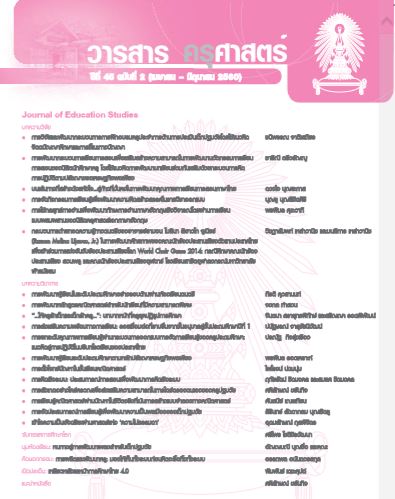การวิจัยและพัฒนากระบวนการการฝึกอบรมครูประจำการด้านการประเมินเด็กปฐมวัย โดยใช้แนวคิดจิตตปัญญาศึกษาและการชี้แนะทางปัญญา
Keywords:
การวิจัยและพัฒนา, กระบวนการฝึกอบรมครูประจำการ, การประเมินเด็กปฐมวัย, จิตตปัญญาศึกษา, การชี้แนะทางปัญญา, RESEARCH AND DEVELOPMENT, IN-SERVICE TEACHER TRAINING PROCESS, ASSESSMENT OF YOUNG CHILDREN, CONTEMPLATIVE EDUCATION, COGNITIVE COACHINGAbstract
งานวิจัยนี้มีวัตถุประสงค์เพื่อสร้างและพัฒนากระบวนการฝึกอบรมครูประจำการด้านการประเมินเด็กปฐมวัยโดยใช้จิตตปัญญาศึกษาและการชี้แนะทางปัญญา การวิจัยครั้งนี้เป็นการวิจัยและพัฒนา โดยใช้การเก็บรวบรวมข้อมูลเชิงคุณภาพ ประกอบด้วย 5 ขั้นตอน ได้แก่ 1) เตรียมการ 2) การพัฒนาและวิจัยระยะที่ 1 สร้างกระบวนการฝึกอบรมครูประจำการด้านการประเมินเด็กปฐมวัยโดยใช้จิตตปัญญาศึกษาและการชี้แนะทางปัญญา 3) การพัฒนาและวิจัยระยะที่ 2 นำร่องกระบวนการฝึกอบรมฯ 4) การพัฒนาและวิจัยระยะที่ 3 ทดลองใช้กระบวนการฝึกอบรมฯ และ 5) การนำเสนอกระบวนการฝึกอบรมฯ ฉบับสมบูรณ์ กลุ่มเป้าหมาย คือ ครูประจำการที่สอนในระดับปฐมวัยที่มีวุฒิปริญญาตรี หรือสูงกว่าด้านการศึกษาปฐมวัย หรือเป็นครูที่ปฏิบัติงานและมีประสบการณ์สอนในโรงเรียนอนุบาลมากกว่า 1 ปี เครื่องมือหลักที่ใช้ในการวิจัยครั้งนี้ประกอบด้วย แบบประเมินความสามารถของครูประจำการในการประเมินเด็กปฐมวัย แนวคำถามเพื่อเก็บข้อมูลครูในประเด็นการปฏิบัติงานด้านการประเมินเด็กปฐมวัยและการตระหนักรู้ และแนวคำถามเพื่อประเมินความพึงพอใจของกระบวนการฝึกอบรมฯ วิเคราะห์ข้อมูลเชิงคุณภาพ โดยใช้วิธีการวิเคราะห์เนื้อหา ด้วยการตีความสร้างข้อสรุปแบบอุปนัย
ผลการวิจัยพบว่า กระบวนการฝึกอบรมครูประจำการด้านการประเมินเด็กปฐมวัยโดยใช้จิตตปัญญาศึกษาและการชี้แนะทางปัญญาเป็นกระบวนการพัฒนาครู เป็นกระบวนการที่ให้ความสำคัญกับการเปลี่ยนแปลงมิติด้านในหรือด้านจิตใจไปสู่มิติด้านนอก โดยสร้างให้เกิดการตระหนักรู้ ประกอบกับการสนับสนุนการปฏิบัติงานของครูผ่านการชี้แนะ ซึ่งกระบวนการฝึกอบรมฯ ประกอบด้วย 10 องค์ประกอบ ได้แก่ (1) ความสำคัญ (2) ความเชื่อพื้นฐาน (3) วัตถุประสงค์ (4) หลักการ (5) กลยุทธ์ที่ใช้ในการจัด (6) เนื้อหาการเรียนรู้ (7) ขั้นตอน (8) กิจกรรม (9) ระยะเวลา และ (10) การประเมินผล ใช้เวลาทั้งสิ้น 30 สัปดาห์ การประเมินประสิทธิภาพของกระบวนการฝึกอบรมฯ เป็นการประเมินความพึงพอใจของครูที่มีต่อกระบวนการฝึกอบรมฯ ซึ่งพบว่า ครูจำนวนทั้ง 8 คน ทุกคนมีความพึงพอใจในกระบวนการฝึกอบรมฯ ในภาพรวม และครูจำนวน 7 จาก 8 มีระดับความสามารถในการประเมินพัฒนาการเด็กปฐมวัยสูงขึ้น
The purpose of this research was to construct and develop the processes of in-service teacher training in assessing young children based on Contemplative Education and Cognitive Coaching. This was a research and development design using the qualitative method to collect data. The research procedure consisted of 3 phases and was divided into the following 5 steps: 1) preparation; 2) development and research phase I: develop the initial draft of the in-service teacher training processes in assessing young children based on Contemplative Education and Cognitive Coaching; 3) development and research phase II: develop the pilot draft; 4) development and research phase III: develop of the try-out draft; and 5) presentation of the final processes. The subjects were in-service teachers who graduated with a bachelor or higher degree in early childhood education or in-service teachers who had more than 1-year teaching experience. The instruments used in the research were the teachers’ ability to assess young children evaluation form and questionnaires. The data was analyzed using inductive analysis.
The research result was that the in-service training process in assessing young children based on Contemplative Education and Cognitive Coaching valued the inner self or minds of teachers. Its goal was to create self-awareness and at the same time support teachers’ assessment performance through coaching. The training consisted of 10 components: (1) significance of the training process; (2) beliefs of the training process; (3) objectives of the training process; (4) principles of the training process; (5) strategies for the training process; (6) contents; (7) procedures of the training process; (8) activities; (9) schedule; and (10) the evaluation of the training process. The training process lasted 30 weeks. The evaluation of the effectiveness of the training process was to determine the satisfaction of teachers regarding the training process. This found that eight teachers were satisfied with the training process. Also, seven out of eight teachers increased their ability to assess young children.




